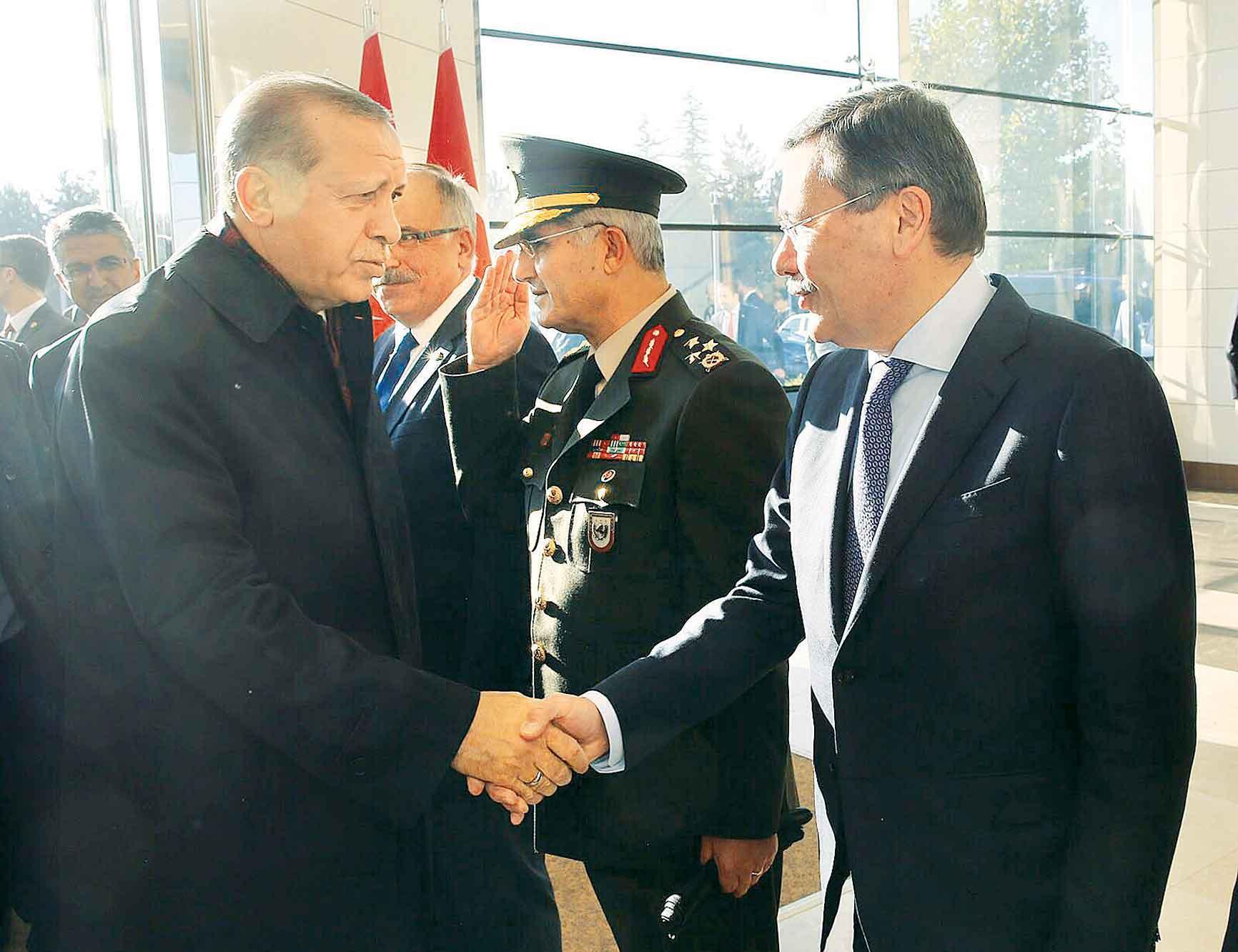
The above photo, showing Ankara Mayor Melih Gökçek shaking hands with President Tayyip Erdoğan before Erdoğan left for Tehran, was posted on Twitter on Oct. 4 by Gökçek’s director for public transportation. It was likely an attempt to give the message that there are no problems between the two men and everything is alright.
Speculation about Gökçek leaving his post, which he has been in since the local elections in 1994, was fueled when a reporter asked President Erdoğan about possible resignations on Oct. 3. “There is no such thing at the moment. But that does not mean it will not happen in the future,” Erdoğan said in response.
Gökçek also issued a message saying that no one from the ruling Justice and Development Party (AK Parti), to which he belongs, had requested his resignation, despite speculation after the resignation of Kadir Topbaş, the AK Parti’s mayor of Istanbul, on Sept. 22. It has been reported that Topbaş resigned after being asked to wait until Oct. 5, the date of Erdoğan’s return from Iran, leaving the post amid the possibility of a more unpleasant situation emerging.
Topbaş’s son-in-law, Ömer Faruk Kavurmacı, is currently under arrest over alleged links with the illegal network of Fethullah Gülen, the U.S.-based Islamist preacher accused of masterminding Turkey’s July 15, 2016 coup attempt. Kavurmacı used to be on the executive board of TUSKON, the international business network of Gülen that is seen as being one of the group’s chief financial resources.
As for Gökçek, he was accused in 2016 by former Deputy Prime Minister Bülent Arınç of “serving” valuable lands in Ankara to Gülenists. Arınç’s own son-in-law, Ekrem Yeter, was later briefly detained after the coup attempt over alleged Gülenist links. Then, when Gökçek tried to get his son Osman Gökçek elected as the head of the Ankara Chamber of Commerce earlier this year, the AK Parti intervened in the vote through a businessman close to itself and he was not able to win. Allegations of corruption have long been raised against the Gökçek administration from within the AK Parti.
The blame game within the AK Parti seems to have been growing behind closed doors, especially since Erdoğan was re-elected as party chairman following the April 16 referendum on shifting to a presidential system. In his first speech upon returning to the party, he said there was a “metal fatigue” in the AK Parti and stressed that one of the most important criteria was that members have “no links to any terror organization” (meaning Gülenists here) – as well as total loyalty.
Gökçek has always considered himself to be semi-autonomous from the parties to which he has belonged. He used to express pride that the Fazilet (Virtue) Party, a predecessor of the AK Parti, only received 17 percent of the vote in Ankara in the 1999 elections, while he received 34 percent.
I still remember when Gökçek revealed the results of an opinion poll he had sponsored as Ankara mayor to myself and veteran journalist Sedat Ergin, back in late August 2001. Gökçek was not among the founding members of the AK Parti invited by Erdoğan, announced earlier the same month, and he was upset. According to the poll he told us (Radikal, Aug. 28, 2001), the AK Parti would not be able to meet the expectations of voters for a new party on the right. “There is no meaning in founding another party to get 15-20 percent in the next election,” he said, criticizing Erdoğan’s AK Parti. “A party should aim to get at least 30 percent.”
Erdoğan’s AK Parti subsequently got 34 percent of the votes in the 2002 election, establishing the first single-party government in Turkey in many years. Gökçek later joined the AK Parti on its second anniversary in 2003.
Erdoğan has put forward Gökçek as the AK Parti’s mayoral candidate in all local elections since then. The 2004 result was a victory for Gökçek, as he received 55 percent of the vote while the AK Parti could only get 46 percent nationally. There was almost no difference in the 2009 local elections, 38.8 percent in Ankara to 38.5 percent nationally, while in 2014 the national AK Parti votes were 45.6 percent and Gökçek got 44.9 percent in Ankara. In the April 2016 referendum, the “Yes” votes, mostly put down to the voters of the AK Parti, were 48.8 percent in Ankara and the “No” votes were 51.2 percent, which was considered a defeat on Gökçek’s account.
Whether or not Gökçek will be able to keep his post by presenting his total loyalty to Erdoğan, the question of whether he is a must for Erdoğan is now on agenda.
The positions of a number of mayors - not limited to Gökçek - members of parliament, and party officials are on Erdoğan’s agenda ahead of the AK Parti’s “consultative meeting” on Oct. 6-8 in the Central Anatolian town of Afyonkarahisar.